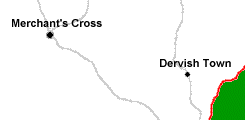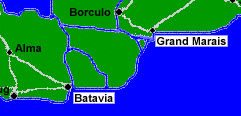
As of 5/24/99

Dwarves that the Dervatear would like to forget!
Developed & Created by
Bob Barrett
The Dervish are a large tribe of dwarves and kin of the Dervatear, who have a few
communities in the eastern mountains of Torresan. The Dervish, however, live above the
ground along the north border with Langington. They refine bog iron and scrap metal,
but do not have any ore to mine in their lands. Farming and lumbering are their main
occupations.
About 1000 years ago a band of Dervatear left the mountains under a charismatic leader
and set up a utopian colony near Merchant's Cross. This town in Langington was then at
the border of  the Torresan forest. The colonists cut lumber, smelted iron, and
prospered. The Dervish population began to multiply rapidly about 400 years ago, when
they started farming the lands they cleared of trees. Because the forest did not grow
back, they continually cut new tracts as they swept south and east from Merchant's
Cross.
the Torresan forest. The colonists cut lumber, smelted iron, and
prospered. The Dervish population began to multiply rapidly about 400 years ago, when
they started farming the lands they cleared of trees. Because the forest did not grow
back, they continually cut new tracts as they swept south and east from Merchant's
Cross.
The average life span of the Dervish is only around 120 years, because so many of them
die in accidents. Those who reach the status of Elder at 150-170 years usually live to
around 250, which is half the life span of the Dervatear. Even so, their population of
over 40,000 is growing explosively, doubling every 60 years, as each female has an
average of eight children who live to adulthood. In the past 200 years several small
tribes of Keranni and Torreans were driven from their lands when the Dervish cut the
forest. It has been calculated that if nothing is done to stop them, they will destroy
all the forests of Torresan within the next 300 years, at which time they will number
1,250,000. Obviously, they will be held at bay with strong magic, but the effort will
be costly.
The Dervish destroy far more trees than they can consume for fuel and building, and turn
the surplus into lumber and charcoal for export to the towns of Langington. The
bubble-shaped charcoal kilns are built of clay over a large pile of wood pieces, and the
clay is baked hard as the wood cooks. When the kiln is cool, they chop a door in the
side, remove the charcoal, and use the structure for a cattle shed. The kilns usually
collapse after 50 or 60 years, to be replaced with wooden barns, but some constructed
with exceptional care have lasted for over a century. From the rounded shape and orange
color, other Torresan people refer to these sheds as 'pumpkin shells'. A derogatory
term used for the Dervish is 'pumpkin head', which is generally shouted from the back of
a swift horse.
The Dervish are organized by clans, composed of a group of related women and their
unrelated husbands. Family names are inherited from fathers, but property is passed
from mother to daughter. The clan is ruled by a council of five elders, who are almost
always female. Marriage within the clan is forbidden, though first cousins and even
half-siblings raised in different clans may marry. The Dervatear of the mountains claim
that too many marriages among close relatives have contributed to the diminished
life span and intellect of the Dervish. When the occasional Dervatear half-wit joins them
in order to find a mate, it is said to raise the average intelligence level of both
groups.
The Dervish are held in disdain by most of the other inhabitants of Torresan because
they have no respect for the forest. They are said to mine wood as if it were ore, with
no thought given to the return of the trees. As long as bountiful woodland remains
along their border, they will continue to profit from its destruction. They are also
careless about the soil they farm, allowing it to wash away until the infertile clay is
exposed, and the land is useless except to pasture goats. When a farm is thus worn out,
the clan moves to the frontier and starts a new one on the rich forest soil.
It is also said that the Dervish are Langingtonians, but only claim to belong to
Torresan to avoid military service and paying taxes. Unlike other dwarves they do not
hoard wealth, but prefer to live modestly and have many children. The mothers do not
nurse their babies, but give them to the elders who feed them the milk of cows or goats.
Only the elders are considered wise enough to raise children properly. Unencumbered by
infants, the young women work as hard as the young men, and often give birth in the
fields. The new mothers are rewarded with a month's rest, during which they sew enough
clothes to last their child two years, and then return to work. Male Dervish are only
allowed such vacations when seriously injured. They celebrate five holidays a year, but
work as usual from dawn to sunset, holding the festivities after dark.
Because the Dervish can obtain everything they desire by hard work, they see no need to
learn magic. Their neighbors say that to learn magic they would have to learn to read
first, and they are too dull even for that. Other distinctive habits of the Dervish are
the use of leather with the fur remaining, the addition of bone meal to their beer, and
the wearing of dried fungus on hats or braided in the hair for good luck.

A Torrean tribe responsible for the pages of history!
Developed & Created by
Bob Barrett
The Texels are a Torrean tribe skilled at agriculture and trade, who have made their
swampy homeland into a region of productive farms. The land was formerly inhabited
by the Tassarak lizard people, but the Texels exterminated them about 300 years ago.
The young men traditionally go to distant cities as apprentice merchants, returning
to the homeland to marry and manage the bride's farm. Older men continue farming,
return to commerce, or become teachers, as they choose. Land is inherited by
daughters only, and by the son's wife if there are none.
The Texels have a high regard for learning, and each person is expected to write a
book in their old age (over 60) to pass on their wisdom. There is a primary school
and a library in each village, and a secondary school in each of the larger towns.
The National Academy in Batavia is a renowned center of scholarship, awarding degrees
in Medicine, Alchemy, Law, Economics, Divinity, Literature, Astrology, Agriculture,
Geography, and Oceanography (the greater part of which is ships and sailing).
Graduates of the Academy are in high demand as advisors to kings throughout the known world. The population is over 100,000 and growing rapidly, both by the high birth
rate and by immigration.
Though the Texels have the numbers and commercial empire to support a
military-industrial complex, they don't enjoy fighting any more than other
Torresanese. The Tylvanee delta still has large tracts of swampland yet undrained,
and the Texels are accustomed to buying what they want, not taking it. Still, it
would be possible for any of a dozen Texel shipping magnates to hire foreign
mercenaries and sail them to the target of his choice.
 The city of Batavia is now the primary port of Torresan. Imported goods are loaded
on small sailing vessels for transport up the Tylvanee River as far as Cedar Rapids.
A network of canals connects Batavia to all the Texel towns of the Delta, and good
roads lead to Port Douglas and Aalsmoor. The canals also serve to drain water from
the fields, which are enclosed with earthen walls and pumped dry with windmills. The
main products exported from Batavia are dried fish and paper.
The city of Batavia is now the primary port of Torresan. Imported goods are loaded
on small sailing vessels for transport up the Tylvanee River as far as Cedar Rapids.
A network of canals connects Batavia to all the Texel towns of the Delta, and good
roads lead to Port Douglas and Aalsmoor. The canals also serve to drain water from
the fields, which are enclosed with earthen walls and pumped dry with windmills. The
main products exported from Batavia are dried fish and paper.
The Texels have always been known for the quality of their rice paper, but in recent
years a new variety, not as
strong but suitable for books, has been exported in great quantity and sold cheaply
throughout Western Glashia. This cheaper paper is made from the wood of spruce and
fir trees, which do not grow in the Texel lands. The logs are cut in the Chelakay
lands in the foothills of the Mountains of Nerous-taan, and floated down the Grayling
River. Though the Dervatear of the mountains and a few isolated
inland kingdoms still produce their own paper, the art is being lost wherever the
Texel paper is sold.
 Return to Bob Barrett's TORRESAN.
Return to Bob Barrett's TORRESAN.



 the Torresan forest. The colonists cut lumber, smelted iron, and
prospered. The Dervish population began to multiply rapidly about 400 years ago, when
they started farming the lands they cleared of trees. Because the forest did not grow
back, they continually cut new tracts as they swept south and east from Merchant's
Cross.
the Torresan forest. The colonists cut lumber, smelted iron, and
prospered. The Dervish population began to multiply rapidly about 400 years ago, when
they started farming the lands they cleared of trees. Because the forest did not grow
back, they continually cut new tracts as they swept south and east from Merchant's
Cross.
 The city of Batavia is now the primary port of Torresan. Imported goods are loaded
on small sailing vessels for transport up the Tylvanee River as far as Cedar Rapids.
A network of canals connects Batavia to all the Texel towns of the Delta, and good
roads lead to Port Douglas and Aalsmoor. The canals also serve to drain water from
the fields, which are enclosed with earthen walls and pumped dry with windmills. The
main products exported from Batavia are dried fish and paper.
The city of Batavia is now the primary port of Torresan. Imported goods are loaded
on small sailing vessels for transport up the Tylvanee River as far as Cedar Rapids.
A network of canals connects Batavia to all the Texel towns of the Delta, and good
roads lead to Port Douglas and Aalsmoor. The canals also serve to drain water from
the fields, which are enclosed with earthen walls and pumped dry with windmills. The
main products exported from Batavia are dried fish and paper.  Return to Bob Barrett's TORRESAN.
Return to Bob Barrett's TORRESAN.